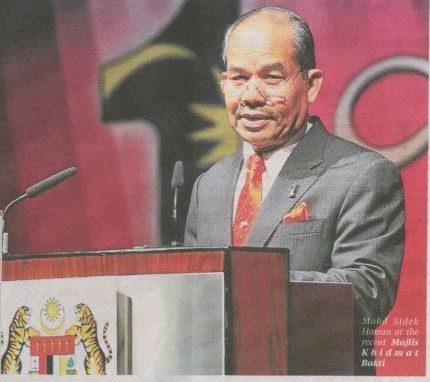Civil service is a calling
Professor Tan Sri Dato' Dzulkifli Abdul Razak
Learning Curve: Perspective
New Sunday Times - 11-03-2012
WHAT IT TAKES:
Heading the civil service starts with being a worthy leader
LIFE as a civil servant can be both rewarding and daunting. You must have the right attitude to provide efficient service to the public.
This is in addition to servicing the government of the day and ensuring its policies are diligently implemented with no vested interest, especially in financial matters.
A civil servant fully engages with clients. This includes listening to their feedback.
In short, civil service is no less a calling where expectations of reward and recognition — though appropriate — is not the priority.
Chief Secretary to the Government Tan Sri Mohd Sidek Hassan conveyed this message at the recent Majlis Khidmat Bakti attended by senior civil servants who have just retired. Mohd Sidek also emphasised the need for strict adherence to ethical behaviour as well as sincerity in carrying out duties.

Only then could taxpayers, who expect nothing less, view the civil service with respect.
It calls for a high degree of commitment from everyone because it needs a fully functional ecosystem before its optimal impact can be realised nationwide.
This was echoed by former Director-General of Health Tan Sri Dr Mohd Ismail Merican in his thank-you speech on behalf of the retired civil servants.
In recounting the ups and downs that most civil servants face, he used the Severe Acute Respiratory Syndrome scare in 2003 as a case in point. A crisis will invariably show the capability of civil servants, especially those in leadership positions, to search for viable solutions. This is vital. The aim is to avoid creating undue tension among citizens or organisations.
Mohd Ismail reminded the heads of various agencies and institutions to be mindful of their responsibilities and not let their position cloud their judgement.
Do not allow your egos to prevent you from serving the people under your watch and the public.
Leaders must be a motivational force, lead by example and be role models. In other words, walk the talk.
Leaders must be comfortable in the company of people. Those in the private sector have other experiences to offer, especially in being inclusive. Those who surround themselves with favourites evade direct communication with their subordinates.
This is not the type of leadership to meet today's challenge of being inclusive, which demands that leaders be confident and willing to make tough decisions and communicate directly with those affected — be it via the mass media or otherwise. The tendency to go into hibernation or adopt a stonewalling attitude is often associated with weak leadership.
Civil servants need to be professional in their dealings (even with political masters) and say what needs to be said and not become "part of the furniture". Many are too eager to be "play safe" leaders of no consequence!
Mohd Ismail also alluded to the fact that while it is good to be technology sawy, it is no substitute for being people savvy because at the end of the day, it is people who matter, and technology is just a means to an end.
Face-to-face (f2f) interaction is superior to sending text messages which is cold and devoid of genuine human feelings — yet another barrier to effective communication.
The event was a night to remember for those who were leaving the civil service, but more so for those who stay on, especially the ones who just came on board.
There is much to learn in taking the civil service to the next level, beginning with being a worthy leader. The starting point is to be humble enough to learn from each other, by suppressing your ego and form a formidable team of civil servants!
Like Mohd Sidek said, civil service is a calling.
- The writer is vice chancellor of the Albukhary International University.
